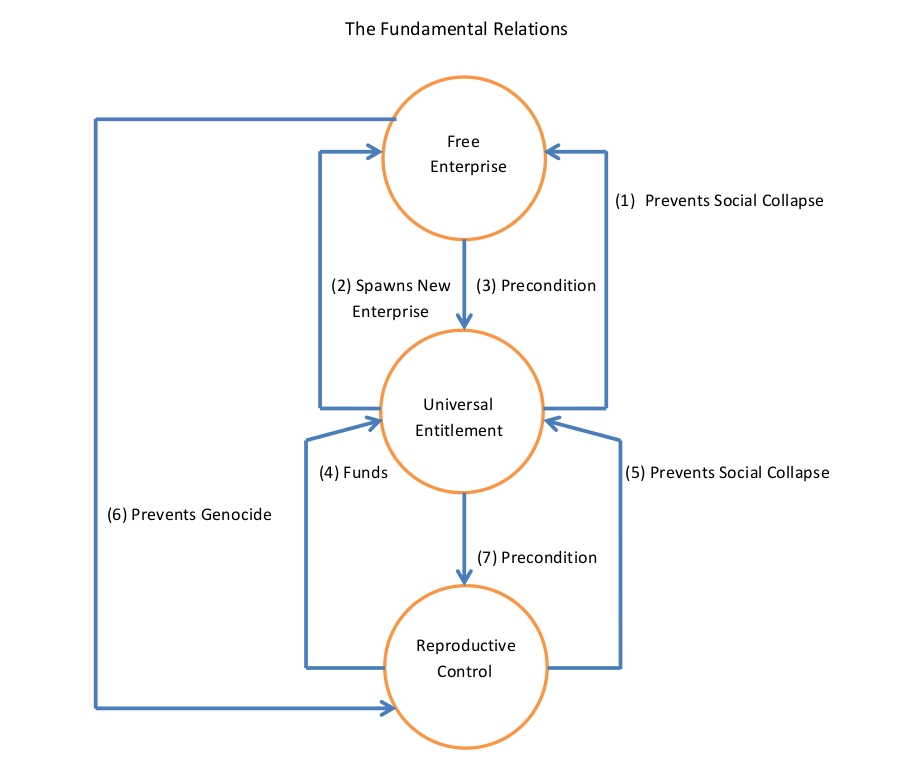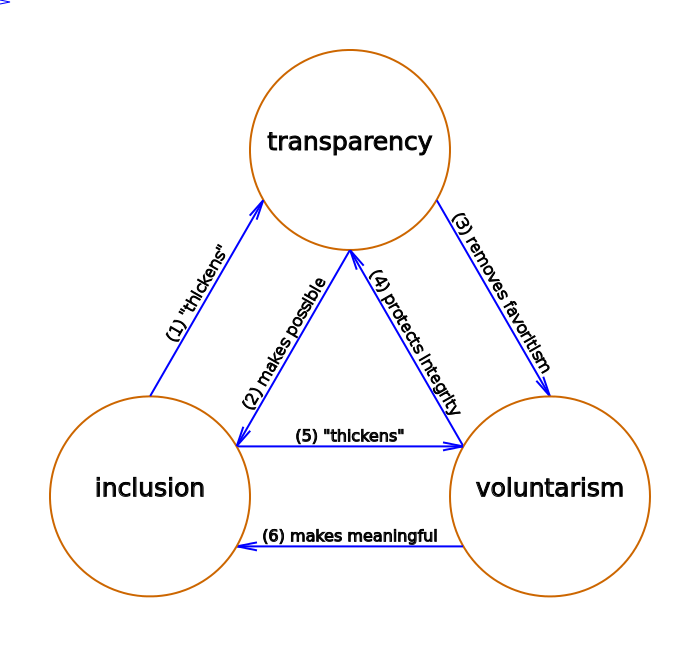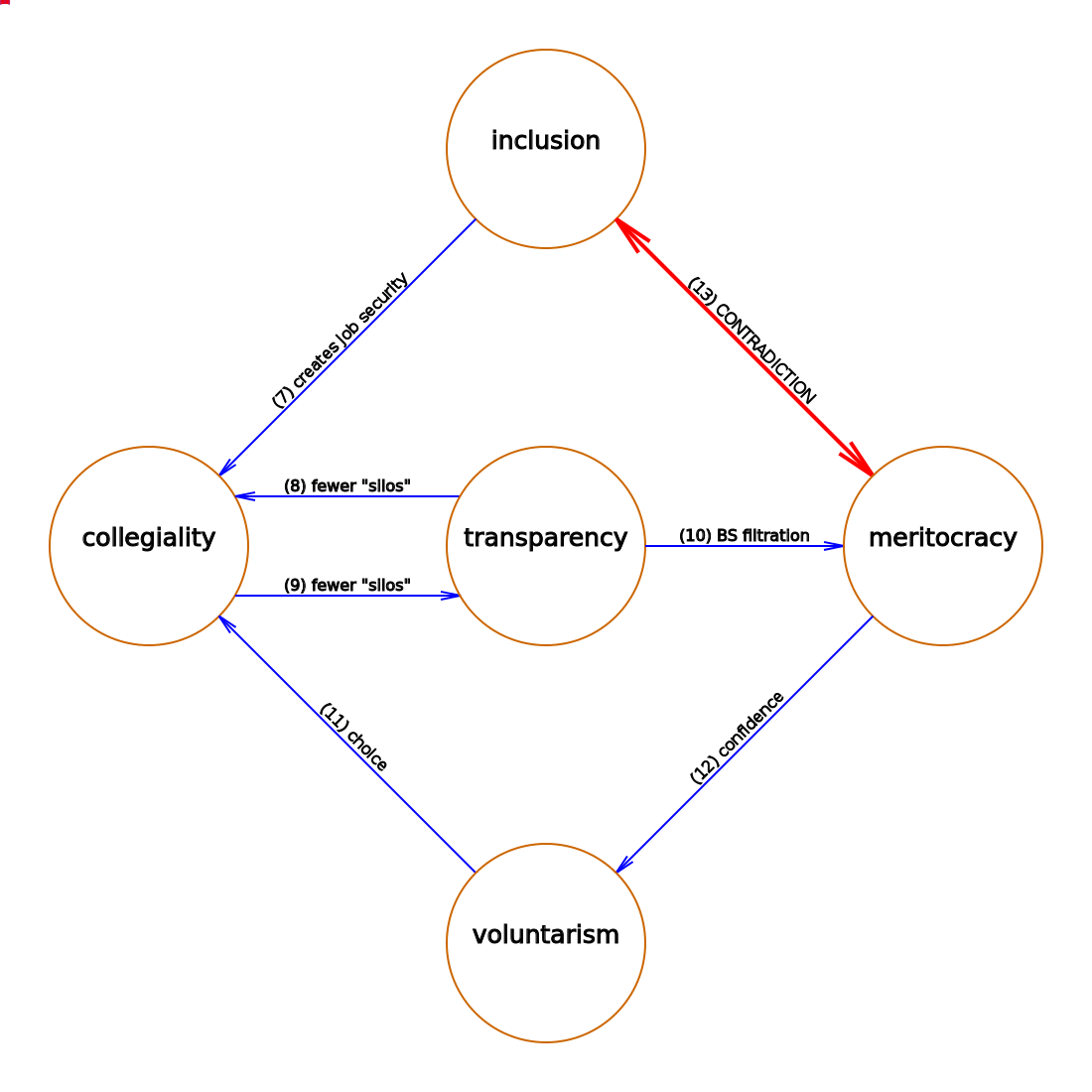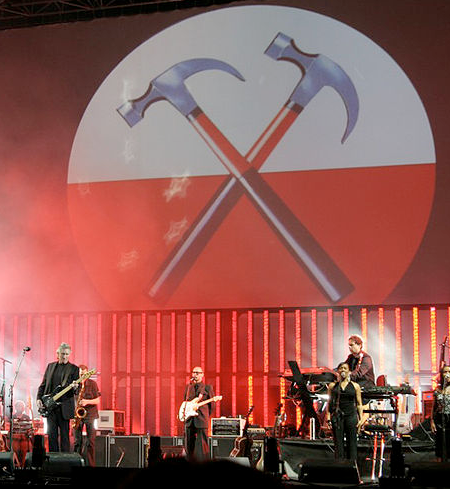The business plan known as AFFEERCE is a simple-yet-intricate combination of propositions. There’s a method to the madness behind its design, and it’s a method of keeping the system as a whole, plausible, accountable and reasonably consistent. So far I’ve identified three features of this methodology:
- A “law of threes”
- “AFFEERCE kickers, is a flimsy metaphor for those who want to kick out one of the legs of a three-legged stool. Stability and prosperity is contingent on the success of all three pillars. Lose one, and the slide of society into barbarism will continue.”
- Intolerance of compromise
- Specifically, compromise between free markets and income equality.
- Tolerance of contradiction
- Limited tolerance, but tolerance nevertheless. This is based on Gödel’s proof that a formal system cannot be both complete and consistent. In case AFFEERCE isn’t a formal system, there’s also the Heisenberg Uncertainty Principle that applies to elementary particles and the Strong Efficiency Hypothesis that applies to financial markets.
The mechanical advantages of a three-legged stool over a two-legged stool are obvious. The latter, for all practical purposes, cannot stand unless it is either very bottom-heavy or very precisely aligned to its center of gravity (about as probable as flipping a coin and getting neither heads nor tales). The part of the book I’ve read so far doesn’t address the (considerably less severe, but certainly real) problem posed by a four-legged stool, but suffice it to say that any three points can reliably be said to be coplanar.
It may also be that author Jeff Graubart has a mental habit of bundling things in threes:
p.10
Similar ideas are cropping up elsewhere under the banner, “progressive libertarian,” but most of those philosophies suffer from three problems.
p. 16
One need look no further than the three contemporaneous milestones that arguably provide a foundational base for the new world I will describe: the women’s liberation movement, the gay liberation movement, and the invention of the microprocessor.
Perhaps the most appealing part of this three-pronged package deal* is the refusal to acknowledge, let alone negotiate, tradeoffs between free markets and income equality. In American public policy debate, this often manifests itself in the rhetorical question (i.e. rhetorical trap): “Which would you rather live in, a security society or an opportunity society?” My answer has always been: “I refuse to acknowledge an intractable tradeoff between those two things.” Graubert, it seems, refuses to acknowledge any tradeoff. This is my kind of people, even if AFFEERCE as a whole is far too authoritarian for my tastes. It seems, in a three variable system, you can max out two variables. The Iron Law of TANSTAAFL manifests in the kicker; the poison pill. In AFFEERCE, the poison pill is total capitulation, not on the part of the Wall Street subsidiary called Washington, but on the part everyone who as fought and died for reproductive freedom (which necessarily works both ways, even among borderline antinatalists like me), including (among others) the pro-choice movement, the civil liberties movement, and the wise people who drafted the Universal Declaration of Human Rights, article 16, section 1.

The flaw, the imperfection, indeed the beauty of AFFEERCE is the glaring contradiction (p. 39) between reproductive control and enlightenment. So, is defense of the Enlightenment to be another casualty among bloody trail of capitulated causes left in AFFEERCE’s wake? Well, two of the three pillars of AFFEERCE are pro-enlightenment, so the fate of the Enlightenment may yet be compromise, rather than capitulation. Big deal, right?
One question that occupies me is whether the AFFEERCE methodology can be applied to things other than AFFEERCE. Would it make sense for me to try to construct a system of central principles (pillars, one of which is a “kicker”), implications (fundamental relations) between the pillars, and an irresolvable contradiction? Could such a construction give the appearance of a shared way of life, an alternative future, maybe even a code of law?
Let’s map it out as a step-by-step process:
- Identify two cherished ideals, both of which I wish we all could enjoy to the limit, without compromise.
- Identify one cherished ideal for which I would fight to the death, as a “kicker,” or as I prefer to say, “Faustian bargain.”
- Determine whether insistence on (2) is the roadblock to resolving the apparent intractable trade-off in (1). If not, repeat your choice of steps (2) through (3), or steps (1) through (3).
OK, now I’ll try my hand at business plan construction using what I surmise to be the AFFEERCE method of business plan construction. For my palatable pillars I choose what I’ll call inclusive production and voluntarism. For the kicker, I designate zero privacy. Here are my explanations of these pillars and what I intend them to mean:
- inclusive production
- This means that everyone is entitled to a job. It is a direct negation of one feature of “free enterprise” as defined by Jeff Graubart. This doesn’t necessarily mean that a particular “employer” must find a role for every applicant, but it does mean that an opening must be found somewhere in the economy. This may require the creation of an employer of last resort on a subsidized basis. This also doesn’t necessarily mean everyone is entitled to paid employment. This business plan is OK with unpaid internships, and possibly other forms of unpaid work. It is more important to avoid meeting the requirement with meaningless “make work” jobs than it is to avoid having an underpaid or even exploited workforce. In a way, this is the exact opposite of AFFEERCE: Getting a job to do is an absolute entitlement, while getting paid is an absolute non-entitlement.
- voluntarism
- This means all associations are voluntary associations and all transactions are voluntary transactions. Broadly speaking, it means nobody has to do anything they don’t want to. In this business plan, it might or might not be more narrowly defined to the crass “nobody’s holding a gun to your head” criterion of “anarcho”-capitalism.
- zero confidentiality
- This means that enterprises operating “within the system” are required to practice open-book accounting. By this I mean that every journal entry is in the public record. By public record I mean the Internet (or a future equivalent). The data are accessible not only to people working within the system, but everyone in the world. Since P&L (profit/loss) and balance sheets are derived from journals, this means the profitability and equity holdings of all enterprises are public knowledge, as well as a host of other details about each one. Of course, this also means that individuals enjoy no privacy whatsoever. For example, if you buy something from a participating retailer (one operating within the system) it is a matter of public record who you are, what you bought and for how much. The public also has access to your salary, your detailed credit history, the approximate inventory of your refrigerator, etc.
Is there a contradiction between the first two pillars? Absolutely. The right of someone to be hired means someone else may have to procure services they neither need nor want. Does the absolute denial of confidentiality resolve the contradiction? At first glance, it might appear that it would not. Let’s flesh out the details of the zero confidentiality arrangement. In the spirit of voluntarism, the “system” in which businesses and individuals are expected to operate should be a voluntary association. This means there is nothing at all wrong with operating outside the system. This being the case, the organization binding people and businesses to inclusivity, voluntarism and extreme transparency will have to offer something of value. More precisely, there must be clear (ideally decisive) advantages to both individuals and businesses from working within the system. The institution in question is roughly analogous to PIV in AFFEERCE. Like PIV, its functions would probably include:
- strong authentication protocols for participants to identify themselves as within the system
- an accounting system to record transactions, enter them into a database and make that database available to (queryable by) the public
- this may involve doing the accounting in some novel unit of currency—I’m undecided as of yet on that detail
- in addition to financial transactions, contracts involving in-system entities are a matter of public record
- also, applications for employment would be submitted from applicants to prospective employers by way of the institution
- businesses are encouraged but not required to post “requisitions” for labor prior to hiring any
For now, I’ll call this PIV-analogue “DOE,” as in “database of everything.” The publication of all contracts and all job applications is the main strategy for resolving the contradiction between inclusive production and voluntarism. The number of people requesting jobs is known. Their stated qualifications are known, and of course are much, much more verifiable than ever before. A deeply searchable database of job requisitions and job candidates should make for almost frictionless matchmaking. The division within DOE responsible for this matchmaking will be called Division of Labor, or “Divlab,” in honor of Ursula K. LeGuin, of course. Nevertheless, there might still not be enough jobs to go around. In that event, DOE will “create” jobs. Remember that jobs need not be paying jobs. That helps DOE stay under budget. One source of jobs within DOE would be for people to maintain the database, basically DBA’s and the like.
Implementation of this business plan will entail creation of a second institution, which we’ll call the Reconstruction and Reclamation Corps, or “Reeks and Wrecks,” in honor of Kurt Vonnegut, of course. This institution will do the heavy lifting when it comes to absorbing surplus labor from Divlab, and will also function as the Department of Public Works of our alternative society. It will specialize in placement of people in 3D work assignments.
Now that we have our three pillars, let’s identify two voluntary consequences:
- Explain how each of the three pillars either implies the another, or prevents it some unspeakable catastrophe or atrocity.
- Identify two voluntary consequences, or opportunities that the three pillars open up to those (a) who live by them and (b) want to pursue them
- Connect the remaining dots. If u don’t spot the contradiction, ur not doin it right.
Here is an illustration of the relationships between the three pillars:

The linkages between inclusion (inclusive production), voluntarism and radical transparency (zero privacy) in this new business plan correspond to Graubart’s fundamental relations. Consider these first six:
- First, let’s establish what I mean by “thickens.” Basically, it translates to “adds fairness to.” I got this idea from the “thick libertarianism” concept:
The topic is the relation between “thin” libertarianism (i.e., libertarianism understood as a narrowly political doctrine) and “thick” libertarianism (i.e., libertarianism understood as essentially integrated into some broader set of social or cultural values).
I generalized this “thick” concept from libertarianism to individualism, voluntarism and contractarianism—and now I suppose there is thick transparency. - I say that transparency helps make inclusion possible because I believe that if the entire body of transactions is in the public record, discrimination and other patterns of exclusion will “come out in the wash.”
- Similarly, radical transparency makes it likely that people and institutions that practice nepotism and other forms of favoritism will face some pressure from the public, and those that don’t will enjoy public support.
- Voluntarism, meaning no unwilling participants in the scheme, should mean people are less inclined to try to feed disinformation into the database.
- Of course inclusion thickens voluntarism.
- Inclusion in a voluntarist economy is more meaningful than having a “make work” job, although admittedly the latter are a feature of this business plan.
Now to identify two voluntary consequences. There are two voluntary consequences of AFFEERCE society; alternative families and enlightenment (see page 37). For my proposed business model, I’m proposing collegiality and meritocracy as voluntary consequences. Since we have Voluntary Association, Collegiality, Inclusion, Meritocracy and Extreme Transparency, we have something that can be called VACIMET. The following diagram illustrates the additional fundamental relations between these two voluntary consequences and the three pillars of VACIMET.

- Job security thanks to guaranteed inclusion in economic production frees workers to think of their co-workers less as competitors and more as colleagues.
- Collegiality fostered by job security and less competitive relationships between colleagues means less incentive to guard trade secrets.
- Transparency (open knowledge, open data, etc.) facilitates collaboration, especially interdisciplinary collaboration.
- Transparency facilitates meritocracy because when skills, credentials and experience are easily verified and errors in the recording of the same are fairly quicly corrected (many eyes, shallow bugs) it should be more likely for the cream to rise to the top, and less likely for the self-promotion to do so.
- Voluntarism means that people (at least outside the Reeks and Wrecks) are among people of their own choosing, meaning fewer barriers to collegiality.
- People’s can have more confidence in their choice of colleagues if they can have more confidence in their competence.
- There is a contradiction between meritocracy and inclusion. It never occurred to me until recently that this is the case, but I was convinced of this by Felix Stadler:
The openness in open source is often misunderstood as egalitarian collaboration. However, FOSS is primarily open in the sense that anyone can appropriate the results, and do with them whatever he or she wants (within the legal/normative framework set out by the license). This is what the commons, a shared resource, is about. Free appropriation. Not everyone can contribute. Everyone is free, indeed, to propose a contribution, but the people who run the project are equally free to reject the contribution outright. Open source projects, in their actual organization, are not egalitarian and not everyone is welcome. The core task of managing a commons is to ensure not just the production of resources, but also to prevent its degradation from the addition of low quality material.
We can only hope that the meritorious can find it in their hearts to find, if not merit, at least investment potential in the R&R “charity hires.”





